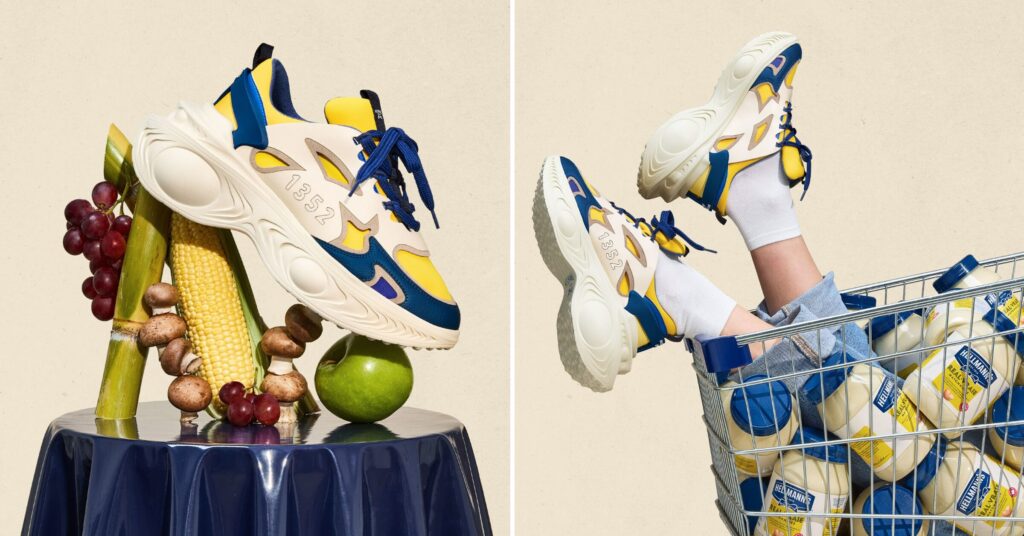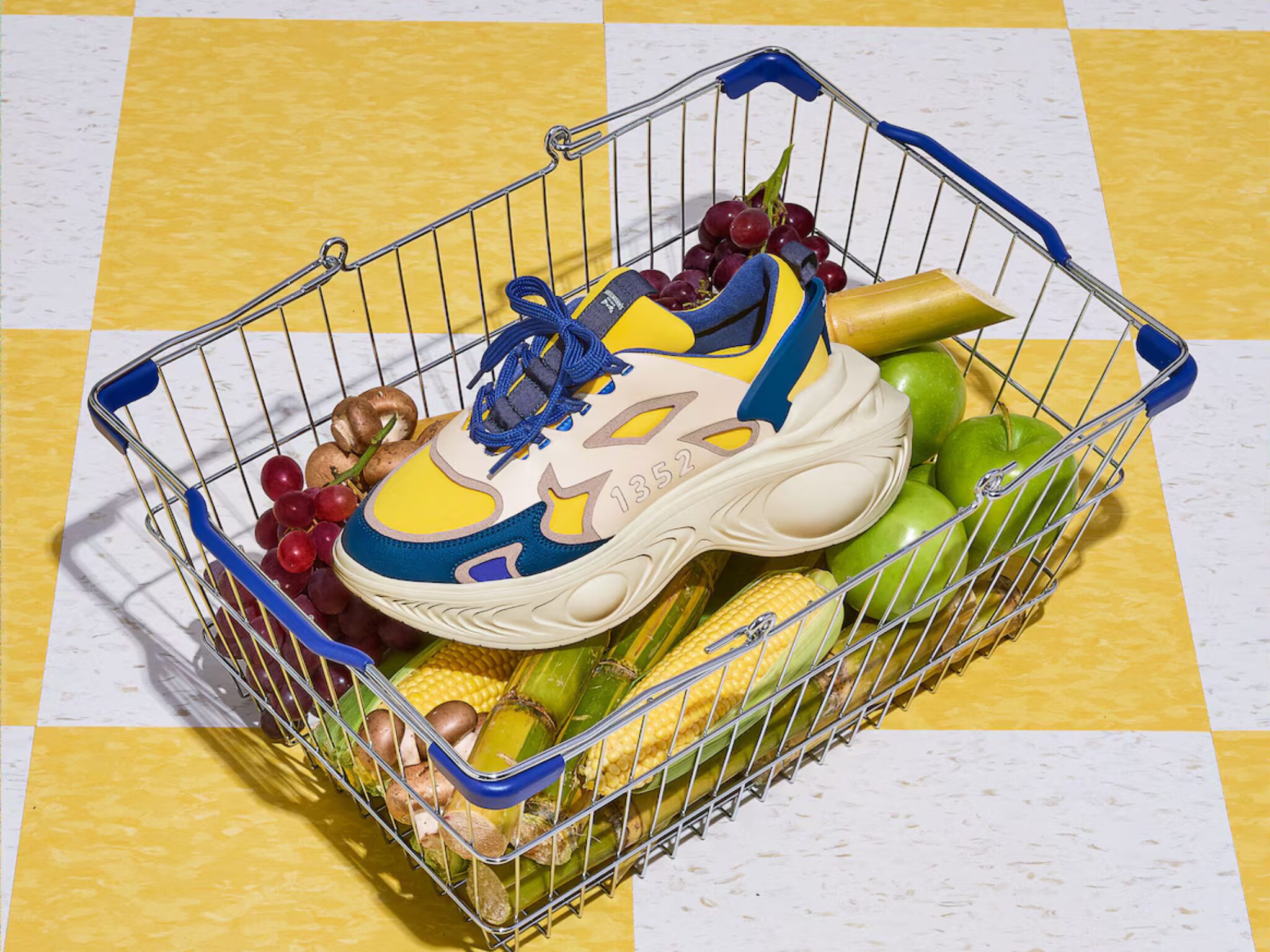4 Mins Read
Unilever-owned mayonnaise brand Hellmann’s Canada has partnered with Italian sustainable fashion label ID.Eight to launch a limited-edition collection of sneakers made from food waste.
Mushrooms, corn, apples and grapes – these may be part of your next meal, but they also might be in your next shoe. That’s the idea behind the new sneakers unveiled by Hellmann’s in partnership with ID.Eight, which are part of the mayonnaise giant’s ongoing food waste awareness campaign.
The 1352: Refreshed Sneakers take their name from a disturbing statistic – it’s a reference to the amount of money ($1,352) Canadian households spend on food that goes to waste each year. The campaign is meant to highlight the impact of food waste in Canada, and promote conscious consumption amid the cost-of-living crisis.
“With 1352: Refreshed Sneakers we’ve created a visual representation of Canadians’ food waste, aimed at sparking conversation and challenging consumers to take small steps to reducing that $1,352 amount of food that’s wasted each year,” said Hellmann’s Canada senior brand manager Harsh Pant.
New sneakers part of Hellmann’s food waste campaign
With their yellow, white and blue hues, the new running shoes are reminiscent of Hellmann’s mayonnaise bottles. They were designed by ID.Eight, a Florentine brand known for making vegan, eco-friendly sneakers using food waste from produce like apples, corn and grapes. The sneakers are made up of materials derived from each of these ingredients, alongside waste from mycelium and sugarcane.
“Hellmann’s commitment to using local ingredients and their mission of reducing food waste complements ID.Eight’s commitment to using sustainable and quality materials, making them a natural partner for us,” said ID.Eight co-founder and brand manager Giuliana Borzillo.
One study suggests that 58% of all food is wasted or lost in Canada, but 32% of it could be redirected to support its communities – nearly seven million Canadians (over a sixth of its population) suffer from food insecurity. This also translates to 56.5 million tonnes of greenhouse gas emissions, and nearly $50B in economic losses.
Tackling food waste should be an environmental and social priority, as pointed out by the UNEP. “Hellmann’s has a longstanding history of taking the necessary steps to address, raise awareness, and reduce food waste,” said Pant. The 1352: Refreshed Sneakers are part of its Make Taste, Not Waste campaign, which was launched in 2018 to fight this issue.
This has involved the four-week-long Fridge Night challenge, dedicated Super Bowl ads for the last four years, a partnership with Ogilvy for use-what-you’ve-got recipes, a Smart Jar that revealed hidden messages when placed in fridges at 5°C or lower, and a Meal Reveal tool to provide recipe ideas from what people have in their fridges.
Canadians can enter a draw to win a pair of the limited-edition sneakers, and each entry will see Hellmann’s donate the equivalent of 10 meals to food waste charity Second Harvest. An accompanying website page hosts leftover recipes using the ingredients found in the shoes. The brand has also committed to providing a C$25,000 ($18,300) donation, which it says would provide enough healthy food for 75,000 meals in Canada.

Unilever walks back on climate pledges
While Hellmann’s has certainly made some strides in raising food awareness around food waste and sustainability, its parent company, Unilever, has been in the crosshairs of environmentalists lately.
Long seen as an environmental, social and corporate governance (ESG) leader, the CPG giant last week announced that it was abandoning or watering down some of its climate and social goals, in the wake of increased pressure from shareholders to focus on financials first.
Unilever has a net-zero commitment for 2039, with its scope 3 emissions the main area needing attention (they make up 98% of its footprint). A month ago, it had announced its target to reduce absolute scope 3 emissions, cutting energy and industrial emissions by 42%, and forest, land and agriculture by 30% come 2030 (from a 2021 baseline).
However, CEO Hein Schumacher told Bloomberg that the company has now updated some of its ESG goals. This included delaying a goal to make 100% of its plastic packaging reusable, recyclable or compostable, changing its target to halve virgin plastic use by 2025 to reduce it by only one-third by 2026, lowering its goal to source 100% of its key crops sustainably to 95%, and slashing its promise to protect 1.5 million hectares of land and oceans to a million hectares instead.
Unilever’s commitment to pay all direct suppliers a living wage by 2030 now just covers half of the suppliers making up its procurement spending by 2026. The business has also dropped several pledges, including a commitment to spend €2B per year on diverse businesses globally, having 5% of its workforce be comprised of people with disabilities by 2025, and making all its ingredients biodegradable by the end of the decade.
And while Hellmann’s is asking people to waste less food, Unilever itself has abandoned its goal of cutting food waste in its operations by 50% by 2025.
Similarly, Unilever’s intention to roll out carbon labels on the packaging of all 75,000 of its products by 2026 seems to be at a standstill. “It is possible that some of our brands may wish to communicate product carbon footprints in the future, and for this having accurate data is essential,” a company representative told Green Queen last week.
“We also know information must be provided in context to be meaningful to consumers,” they added, outlining that the business was “committed to improving transparency of GHG emissions” in its value chain. “Our collection of more accurate data will help Unilever to make more informed procurement decisions as we work towards our climate targets.”




